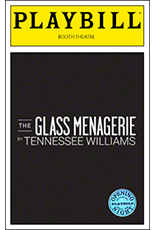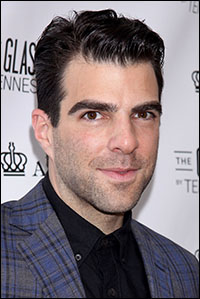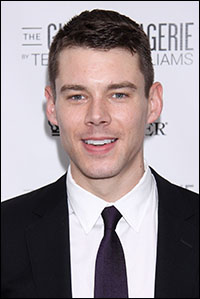
The lucky thing about the seventh Broadway opening of The Glass Menagerie Sept. 26 at the Booth is that there's no one still around claiming to have been in that number March 21, 1945, who saw Laurette Taylor deliver the Amanda of the Ages.
They took the memory of that "memory play" with them. What brings people out to see Tennessee Williams' tender, lyrical homefront paean now is what Tom Wingfield, in this opening narration, calls "the long-delayed but always expected something that we live for." In the context of his speech, this refers to a Gentleman Caller who will sweep his shy sister off her crippled feet and into a happy ending.
For the audience who shows up to see another suitor strike out, it's a persistant hope of seeing a definitive rendering of this moving masterpiece. And the first-nighters who showed up this time had higher hopes than usual of striking gold.
"I've seen lots of Menageries in my life, and I keep hoping that this will be The One," confessed Victor Garber as he penetrated the exciting buzz filling Shubert Alley. Susan Blackwell, arriving with her [title of show] playing partner, Hunter Bell, was operating on more than a half-tank of hope. "I saw this production of The Glass Menagerie, at the A.R.T., and I'm thrilled to be seeing it again because I. Loved. It. It's really remarkable. I was saying I don't think I've seen a production of it like this — I've seen many productions of The Glass Menagerie but one never so current, so naturalistic and stylized at the same time. I loved it!"
The wunderkinds in charge of this reimagined overhaul of Williams' historical Broadway breakthrough are committed to a deeper reading of the text than is usually the case, physicalizing words that have become part and parcel of our theatrical DNA. Director John Tiffany and movement director Steven Hoggett, who collaborated on Black Watch and the Tony-winning Once, apply themselves to unlocking secrets in text, bringing an astonishing freshness to the assignment. To this end, they have hired a brilliant, almost idealized cast — Zachary Quinto is the surrogate Williams, a poet relegated to mundane warehouse chores in order to support his overbearing mother, Amanda Wingfield, an aging Southern belle with a coquette's grasp of the realities that menace her cycnical son and crippled daughter.
[flipbook]
The inestimable Cherry Jones musters an interesting brand of brass-tacks coyness, and Celia Keenan-Bolger is the waif dependent on the kindness of her brother.
Act I wears the title Preparation for a Gentleman Caller, and Act II The Gentleman Calls. Brian J. Smith fills that bill with an empty bravado you can't take to the bank. Jones reluctantly admits that, despite the perfect fit, she had to be talked into playing Amanda by director Tiffany. "John is so collaborative that I can't honestly tell you where he starts, where I start, where he leaves off and where I leave off. That's the kind of director he is. He allows you to invest so much in the production and in each other that it's just this orgy of creativity — in the best way.'
Regionally, she's especially well-synched with Amanda. "I feel like I'm cheating because I am from the South — it does help," she allowed. "I love that Amanda loves those children. She will do anything to see those children succeed and to see Laura survive. She has a child who is incapable of surviving on her own. She has got to see her either get into a business career or see her married, and that's why, when The Gentleman Caller arrives, every egg is in that basket. The thing about the way Celia Keenan-Bolger and Brian J. Smith play it is that I think it's a first-class Menagerie — I know it's a first-class Menagerie — when you look at those kids and you think, 'They're perfect for each other. This could be a long, happy, happy life together.'"

Buy this Limited Collector's Edition |
The Gentleman Caller, immaculately dressed, is the first Broadway role in which Smith managed to keep all his clothes on or the duration of the play (unlike Come Back, Little Sheba and The Columnist). "He does feel a little 'weird,'" he conceded. "Maybe I should run around and take my shirt off and party, but Amanda wouldn't have it.
"I was really surprised, as we were going through the process of rehearsing it — even going through previews — about the parallels between my life and Jim's life, the things I've been through as an actor. I didn't work in a warehouse, but I think most actors know what it feels like to go through periods where your star is shining to its potential and you're not reaching the thing you are trying so desperately to reach."
Rehearsing with his fellow players was a particular joy. "Working with Cherry and Zach is a master class. Not only is it a master class of craft, watching these amazing human beings, who are so generous with their time and with their advice and with their sense of compassion, is great. And Celia is one of the most incredible young women I've ever worked with. I'm flattered I get to call someone like that a friend."
Keenan-Bolger is another who seems to be ideally cast, but she insists it's not as spot-on as it appears. "Laura is almost the opposite of who I am, and I find that really, really freeing. It's wonderful. I love her. From the moment I auditioned for this part, I was, like, 'Oh, I get her.' My favorite thing about the role is that I'm not like her. I get to do something that is so foreign to how I feel inside and who I am. I find that exhilarating, and then getting to do it with those three people. That's the best job in the world."
| |
 |
|
| Zachary Quinto | ||
| Photo by Joseph Marzullo/WENN |
Never ones to rest on their Tony laurels, director Tiffany and Bob Crowley started working on Menagerie's costumes and complex set design two weeks after their Tony wins for Once — on a train trip from Penn Station to Boston to check out a possible launching pad. "Essentially, we designed the show on the train — literally," Crowley beamed. "We both knew the play really well and loved it from an early age. I read it when I was 15 and wanted to design it all my life, and it just came together."
Judging from the results, it was pretty deep read. "We talked very abstractly about memory and how you put it on stage — how you put characters who are completely isolated in time. Tom says, in the opening speech, this is not a realistic play so we talked about how to represent that and how that might be marooned in black space, like they're floating in time. We talked poetically and tried to find a metaphor for that."
Hence, Laura's comings and goings in the play — through the living-room sofa — seem to be the most logical and natural thing in the world. (Ordinarily, your mind would argue that, but here it seems like a fanciful and quite acceptable flourish.)
"The play is so exquisite, and there's so much information given to you about their status and their lack of everything, yet Amanda brings that huge culture with her from the South. You don't need very much. You need great actors and a great script. You do not need a lot of scenery." True to those words, the rise-and-shine breakfasts and the disastrous dinner with The Gentleman Caller are handily dismissed in mime.
| |
 |
|
| Brian J. Smith | ||
| Photo by Joseph Marzullo/WENN |
This was also the city where The Glass Menagerie almost came to an abrupt and emphatic end. "There's a great story about Tennessee spending the night in some guy's dorm up there. As legend has it, he kinda made a move on this guy, who really wasn't reciprocating so there was a hasty exit from the dorm room where he ended up leaving his Menagerie manuscript, and he was notorious for having just one copy of his plays and never getting any extra copies of them, never saving copies of them. He left that one and only copy of The Glass Menagerie in this kid's dorm room, but luckily the kid had enough respect for Tennessee to send it back to him."
The next glimmer of The Glass Menagerie as drama was not as a play but as a screenplay titled The Gentleman Caller. Around 1943-44, Williams prepared a few drafts of it for MGM, envisioning Ethel Barrymore (who had just switched her career focus from stage to screen) as Amanda and Judy Garland (then searching for some serious, non-singing roles) as Laura. Unfortunately, Louis B. Mayer, was adamant the daughter would be filled by his personal pet, Greer Garson, British accent and all.
"It almost went into production," Quinto recounted, "but then it got diverted into turnaround — thank God! — because, if it hadn't, it would never have been a play. It's a masterpiece of a play. Although he won Pulitzer Prizes for other works, they were — alongside The Glass Menagerie — less distilled versions of himself." (Its 1945 Pulitzer was, instead, pinned on Mary Chase's six-foot-tall invisible rabbit, Harvey).
When the movie did come out five years later with Gertrude Lawrence (miscast in her final film), Jane Wyman, Kirk Douglas and the only actor Williams approved of, Arthur Kennedy, it was painfully unremarkable. Orson Welles had lobbied to direct a cast of unknowns — to no avail; instead it was directed by Irving Rapper, whose claim to fame is that he directed "Now, Voyager" — and tried to talk Paul Henreid out of his classic two-cigarettes-at-once routine. Tallulah Bankhead got tested for Amanda, and, although Rapper thought her the greatest Amanda he'd ever seen, Jack Warner nixed the notion because he'd had enough drunken-star worries with Errol Flynn. The play didn't get its justice done on screen until 1987 when Paul Newman helmed a version with Joanne Woodward, Karen Allen, John Malkovich and James Naughton.
The starry, starry opening glittered with Shea Arender, Teddy Bergman, Sandra Bernhard, Eric Bogosian, JC Chandor, Adam Chanler-Berat, John Ellison Conlee, Tyne Daly, Dana Delany, Colin Donnell, Harvey Fierstein, Brian Gallagher, Jeff Goldblum, Carla Gugino, Kate Jennings Grant, Mamie Gummer, Jessica Hecht, David Henry Hwang, Megan Hilty, Doug Hughes, Marin Ireland, Adam Kantor, Moises Kaufman, Andrew Keenan-Bolger, Tony Kushner, Scott Landis, Caissie Levy, Pam MacKinnon, Kathleen Marshall, Michael Mayer, Andrew McCarthy, Cristin Milioti, Lin-Manuel Miranda, Leonard Nimoy, Susan Bay Nimoy, Marsha Norman, Steven Pasquale, Diane Paulus, Parker Posey, Sarah Saltzberg, Will Swenson, Richard Thomas, Randy Weiner, Betsy Wolfe and BD Wong.


































































































